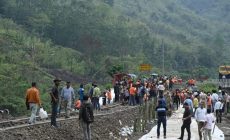Churches hold discourse on how best to address alarming use of Sunflower Drug
Morung Express News
Kohima | September 30
‘Nagaland is facing human crises of chemical abuse today,’ commented a renowned doctor. It is a fact that addressing the menace of drug dependence is not only for the NGOs, government or individual but collective efforts of all sections of society. This urgency is deeply felt now more than ever.
Concerned with the alarming use of ‘Sunflower Drug,’ street name for inferior quality heroine, particularly among the young populace, Churches held a discourse on how best to address the issue.
Dr Viketoulie Pienyü, Senior Medical Officer, State Mental Health Institute, Kohima, one of the speakers candidly pointed out that, “finally the church is waking up” to the call of a menace which is greatly threatening the society today.
Church leaders under the banner of Nagaland Baptist Church Council (NBCC) Youth department came together on September 29 at NBCC Platinum Hall for a panel discussion on ‘Sunflower Drug and its effect on young people today.’
Drug dependence more severe and grave
While highlighting the history of drug menace in the Naga society since the 1980s, Dr Pienyü observed that today’s usage of substance among the youngsters is much more severe and grave.
Referring to his independent research work Dr Pienyü cited some factors that have led to high usage of substance which are unique to Nagaland. These, he said, are social acceptance of any usage of substance (alcohol, drugs etc), too much leisure time with pathetic lousy work culture, negligent and ignorant parents on their children’s activities, loose pocket money by parents and unemployment issue causing depression, anxiety etc.
He also explained the medical procedural treatment, rehabilitation and recovery. Although substance dependence is a manageable problem with the knowledge expansion over the years, Dr. Pienyü with decades of experience stated matter-of-factly that “it is the most difficult disease to treat” because it affects every aspect of an individual.
Programme Manager, Kripa Foundation, Vikholie explained on the various classification of drugs namely depressant, stimulant and hallucinogen. He pointed out its effects on the physical, occupational or financial, familial or social, psychological and legal.
While expressing delight on the churches for coming forward to address this issue confronting the society, Vikholie suggested the need for church leaders to understand the reasons why people start, why do people take drugs and why some people become dependent and others do not.
“Before we solve the problem, we have to identify and understand the factors of the problems first” he stated.
Churches confronted with big problem
With attractive acronyms of drugs which are rampantly available in the market, S Suhuto Chishi, moderator of the panel discussion said this has become a pressing and challenging issue for the church.
Alarmed by the increasing use of drugs, he stated “as leaders we cannot simply be mere spectators” since it is posing grave threat to the lives of young people, particularly to the school and college students.
Toshi Sanglir, K Nigato Chishi and Wangchah Konyak panellists highlighted how their respective churches have taken up activities to tackle the problem. They also emphasised the need to do more to address this grave challenge.
Dr Pienyü and Vikholie suggested the growing need for churches to pool more resources to train church leaders how to work and help substance users, and partner hand in hand with the NGOs.
The panellists were youth secretary from WSBAK, ABAM and KBBB.
Source: https://morungexpress.com/nagaland-facing-human-crises-of-chemical-abuse-1







 An orbiting message of peace
An orbiting message of peace Meet R.N. Ravi, who is mediating peace with the Nagas
Meet R.N. Ravi, who is mediating peace with the Nagas The last Konyak headhunters of Nagaland
The last Konyak headhunters of Nagaland The Top Viral YouTube Videos of 2017
The Top Viral YouTube Videos of 2017










Leave a Reply
Your email address will not be published. Required fields are marked (required)